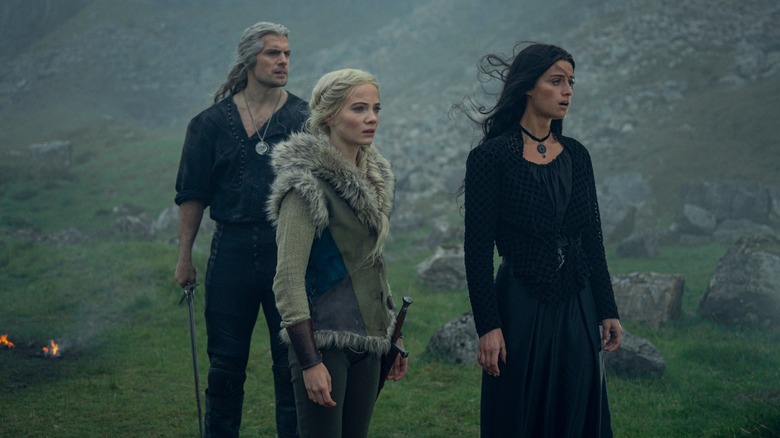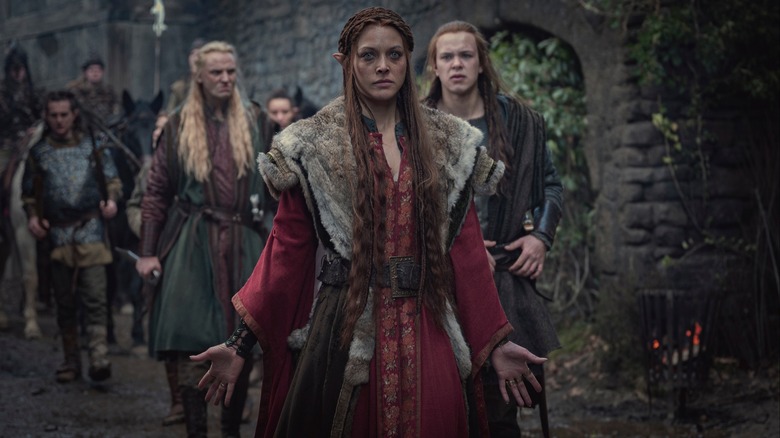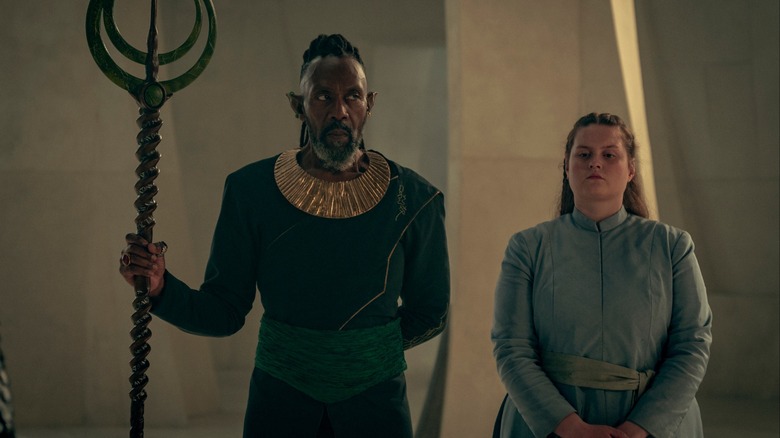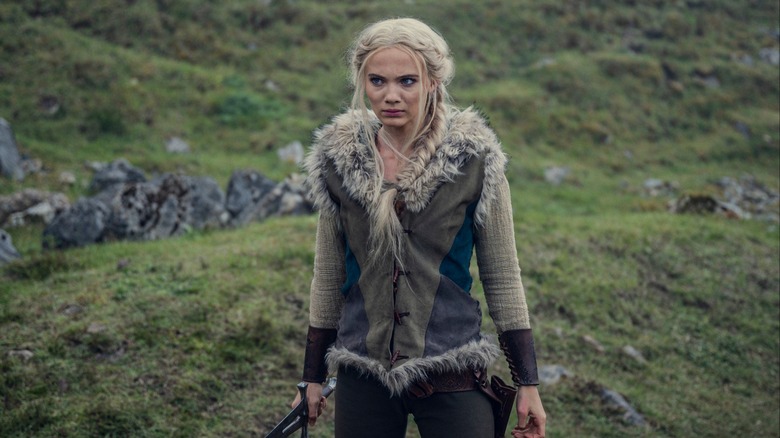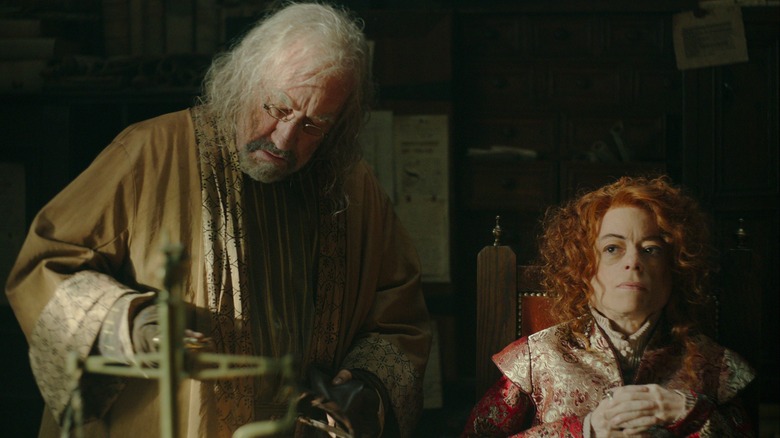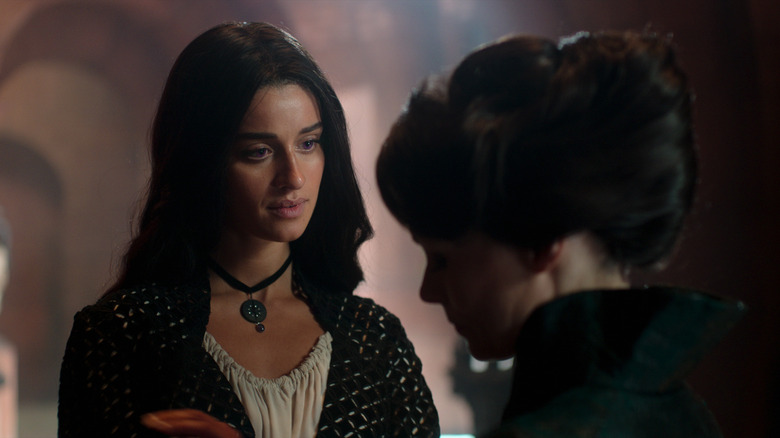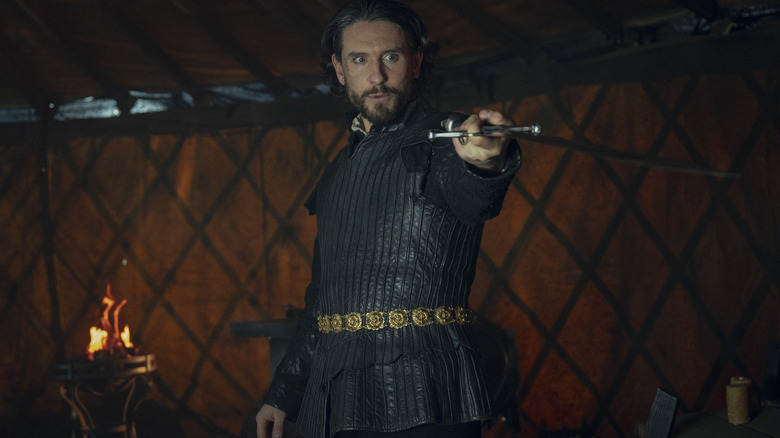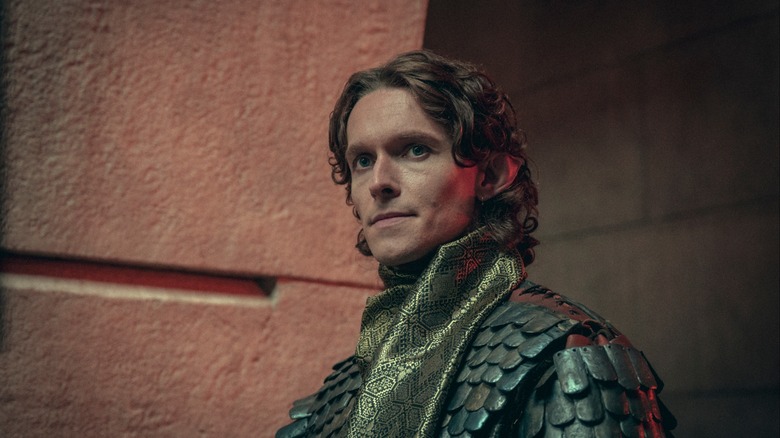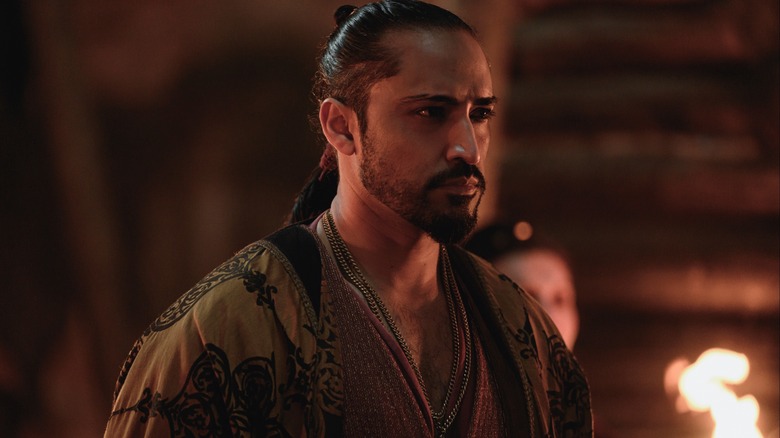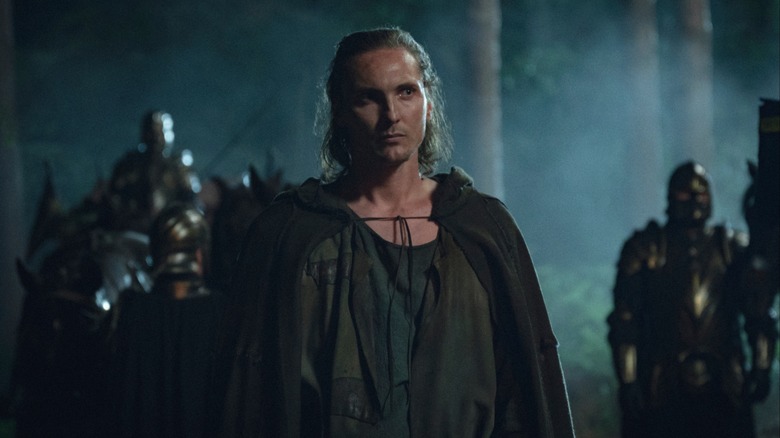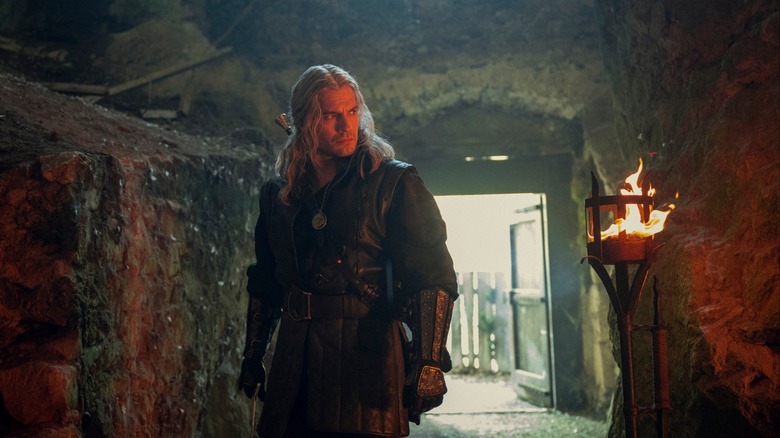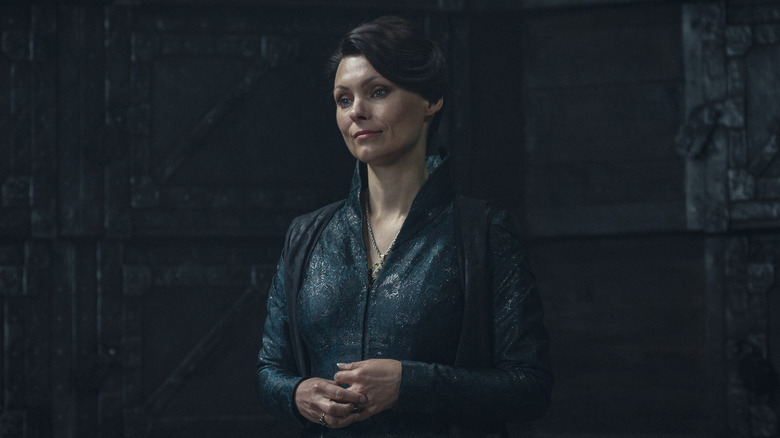The Most Confusing Moments In The Witcher Season 3 Volume 1 Explained
The third season of Netflix's "The Witcher" is already one for the books, with series star Henry Cavill leaving us something to remember him by as he wraps his final episodes as Geralt of Rivia before passing the torch to Liam Hemsworth for Season 4. Though "The Witcher" will continue, the feeling that this season is the end of an era is strong, and only exacerbated by the escalating tension among our cast of characters. With shocking betrayals happening alongside troubling new alliances, it's clear that this is all leading us into a "time of contempt," but it's hard to see exactly how that's all going to play out from where we're standing now.
With the walls closing in on our troubled family unit of Geralt, Yennefer (Anya Chalotra), and Ciri (Freya Allan) and only three episodes to go after this mid-season break, we're still bracing ourselves for some surprises to come that will inevitably blow our socks off. Even still, this has been a wild partial season drop, with some of our Season 2 questions answered just in time for us to come up with a whole slew of new ones for Season 3. What we know for fact is that our three heroes are together for now, but a major shake-up is quite literally written in the stars, and it's hard to say if they'll survive it. No doubt some clarity will come to us after the second part of Season 3 arrives on Netflix July 27, but for the moment, there are a few things that don't quite add up.
Francesca's whole deal
Francesca (Mecia Simson) lost her newborn daughter in Season 2, and that has set into motion a series of catastrophic events for not only the Elves, but just about everyone who has come into contact with them. After a tentative alliance between Nilfgaard orchestrated by Fringilla (Mimi Ndiweni), the Elves were lulled into a false sense of security only for devastation to ensue when her child was killed. This led her to lash out and kill an unknown number of Nilfgaardian children, and frankly, it was a bad PR move at an even worse moment. The reveal that the Nilfgaardian king, Ciri's father, was the culprit in this horror makes it all the more upsetting.
The grief over her child is beyond understandable, and it only makes sense that Francesca wouldn't be making clear decisions at this point. Yet, the fact is that no one else seems to be making particularly good decisions. Francesca is clearly only living for revenge, but that's all the more reason why her support system should be stepping up to put a stop to this so that she can take the time to properly grieve. We know that the Elves have had serious problems with leaders gone rogue in the past, so it's kind of surprising that there aren't better safeguards in place for this eventuality. The only attempts made to bring Francesca back to her senses have been either gentle coaxing or outright betrayal, both of which have made the situation drastically worse. As it is, she's a mother who has lost not just her child, but the hope for a better future for her people, making her the most dangerous kind of leader.
The Elves' history
Maybe it isn't so much that Elf history is confusing, just that we don't know all that much about it, and everything we're told just leaves us with more questions. For instance, "The Witcher: Blood Origin" does the handy work of explaining a bit of context around the Conjunction of the Spheres, a past event that saw worlds merge and delivered an influx of humans, monsters, and human monsters to the world. Even still, we get the feeling that the four-episode spin-off only scratched the tip of the iceberg, considering the fact that we've barely even learned about the background of the Elves or the complicated caste system of their ruling class. We've met some major players and we've seen the beginning of the decline of the Elven empire, but that's a long way away from actually explaining what the Elves are about.
When Geralt meets some Elves in real time in the first season, they're hanging on by a thread after centuries of anti-Elf aggression and attacks. In Season 3, we hear a bit more about Elven history as Yennefer tells the tale of their version of a Joan of Arc, but even that legend seems entirely open to interpretation as Ciri offers counterpoints to Yennefer's educational narrative. When it comes to the Elves, we're understandably getting a lot of exposition in a very condensed format, but just know that if you have questions about what the Elves have been up to since, well, forever, we're right there with you.
Actually, why is everyone so obsessed with Ciri?
On paper, we get that Ciri is a pretty important character, not just to the narrative but also due to the circumstances of her birth. As part of a larger prophecy that declared she could very well bring about the end of the world, our Princess has spent much of her life on the run from any number of people with surprisingly specific lists of reasons to want her dead. Yet, considering she's mostly known for leaving a trail of chaos in her wake at this point, it might make more sense for most of our beloved cast of supporting characters to give her a wide berth rather than actively seeking her out.
From Rience's (Chris Fulton) ill-advised attempt to kidnap her to the elaborate efforts of the Elves, the White Flame, the Brotherhood, and others to track her down, Ciri is the MacGuffin of a lot of people's stories. However, for Geralt and Yennefer, she's an adopted daughter that they'll do anything to protect. That makes for three dangerously powerful wild cards known for killing anyone who threatens them, which is exactly three more than we would personally choose to trifle with. Still, each of the factions at play has a pretty compelling reason to find Ciri immediately, including her mysterious "Elder blood" that makes her both powerful and incredibly dangerous, so this one of those things that we understand at face value. Still, it's kind of wild that there are dozens if not hundreds of people tracking down one magical tween.
Rience torching the library
Considering the fact that they didn't particularly want to be bothered by Geralt or his friends to begin with, Codringher and Fenn's (Simon Callow and Liz Carr) untimely demise at the hands of Rience came as a bit of a shock. The timeless trope of grumpy elderly people surrounded by dusty books in a crowded room is frankly irresistible — that is, to everyone except Rience, who torches their whole place out of ... revenge? Self-protection? Spite? All of the above?
Despite giving Geralt only a sparse amount of intel during his visit, allying with him costs them their lives, and we can't help but feel it was a bit of an escalation. While it shows us that Rience is willing to resort to abject cruelty to accomplish his goals, we kind of already knew that, and we can't help but feel that these two were of way more use alive than dead.
It's possible that all of our confusion around this one is rooted in our love for the lovably curmudgeonly Codringher and Fenn, their cat, and their stellar book collection, but their deaths still feel like a bit of a waste. Not to mention the fact that, even though Rience spares their cat when Fenn asks him to as a sort of "gotcha," we have a lot of questions around what he intends to do with it. If Rience is not prepared to take on the responsibility of feeding and caring for the cat, he should wait until he's older before he takes on the commitment of having one.
The Brotherhood's attitude toward Yennefer and vice versa
Yennefer's feelings toward Tissaia, the Brotherhood, and Aretuza are understandably complex, with her viewing Tissaia both as a mother figure and friend while still acknowledging her more severe personality traits. The Brotherhood has long served as a thorn in her side due to its hubris and unwillingness to change, but she admires their power and sees herself as one of them, even if she occasionally chafes at the idea. This can all be a little confusing, but family is complicated, and Yennefer's feelings toward the people that took her in all those years ago remain in flux.
Tissaia's fondness and pride in Yennefer is clear, but her insistence on secrecy may cause more harm to their relationship than good over time as she appears to be hiding her former pupil from certain truths. Meanwhile, the Brotherhood watched Yennefer almost single-handedly end the Battle of Sodden Hill at the end of Season 1, only to more or less put her on trial in Season 2. Here, they're universally annoyed by her presence but most of the mages ultimately see the benefits of her plea to a more united Brotherhood. By the end of the episode 5, it seems that she's been invited back into the fold, but this is a pretty tempestuous bunch of people, so we'll have to wait and see.
Pretty much everything about the White Flame
This is one where we can rest assured that we'll find out more about it soon, but that doesn't change the fact that we still have pretty much no clue what's going on with Ciri's dad (Bart Edwards), otherwise known as Emhyr var Emreis, otherwise known as Duny, otherwise known as Porcupine Guy, otherwise known as the king of Nilfgaard, otherwise known as The White Flame. Perhaps the biggest twist of the second season was the reveal that he was alive at all, with Ciri believing that he and her mother perished at sea many years before. More shocking, he's the head of Nilfgaard, meaning that he's teetering dangerously into supervillain status after all the damage we've seen this invading army cause to the Northern territories.
For those who have read the books, The White Flame's motivations for finding Ciri are decidedly sketchy, with his fascination with Ciri's Elder Blood inspiring him to make some highly dubious choices in what remains one of the most controversial plot points of the novels. While the Netflix series has stayed mostly on course, it made a few major deviations last season that clued us in that there would be more changes on the way, and that could very well be a good thing. At present, all we know of Duny is his glorified tale of taking back a kingdom with the power of his sword, but we've had reason to believe he's a bit of an unreliable narrator, so we're taking it all with a grain of salt.
Wait, we still don't know what the Wild Hunt is up to
The build-up for the Wild Hunt has been extreme, with "Blood Origin" taking a dive into the distant past in no small part to introduce us to the "leader" of this mystical group of wraiths, Eredin Bréacc Glas (Jacob Collins-Levy). Long story short, this captain of the Xin'trea military makes several bad moves in a very short period of time during the lead-in to the Conjunction of the Spheres, and it costs him. First planning a coup with Balor then siding with Merwyn in hopes of securing a better future for himself and his lover, Brian, he is ultimately banished with some of his men to an alternate dimension. While we haven't seen much in the way of his transformation to the leader of the Wild Hunt, we can guess the story isn't a particularly cheery one.
Further, the Wild Hunt has changed in fairly significant ways from novels to games, so there's no clear understanding of their motives at present. Though this season has already given us serious glimpses of the awesome power of the Hunt, and we know that their pursuit of Ciri will only continue over time, we're still not totally sure what it is that they're up to or what their end goal is. Perhaps to induct Ciri into their group, or simply to get their hands on some of that sweet Edler Blood, we're still very much at the beginning of their part of this story.
Vilgefortz in his entirety
Fans of the novels will be well-aware that Vilgefortz (Mahesh Jadu) is generally up to no good, but it's possible that the specifics around this character might change for the adaptation, so we'll hold our judgment for a while longer. Still, the facts we have aren't looking good, considering that we first met him when he was manipulating Yennefer to return to Aretuza to help him avoid being drafted into service by the king of Nilfgaard. After that, we saw him slay a fellow mage during the Battle of Sodden Hill, seeding some serious doubts around where his loyalties lie. While Tissaia sees the good in him due to their romantic relationship, even that has become fairly questionable at times, particularly when he lashed out at her during Season 2.
Having taken leadership of the Brotherhood, Vilgefortz seems distressingly chill through the first few episodes of Season 3, even charming Yennefer, who has some pretty great reasons not to trust him. Using their shared love for Tissaia, he is able to win Yennefer over, but to what end is still unclear. Though there are plenty of theories swirling around him as of the fifth episode, he's been surprisingly laid back throughout this season so far, indicating that there might be a major blow-up on the horizon. With Stregobor currently imprisoned for hiding a book that he denies having taken, we suspect that this could have easily been a plant placed in his room by none other than Vilgefortz.
Cahir's loyalty to The White Flame
Cahir (Eamon Farren) has been a dubious character from the start, heading the invasion of Cintra and attempting to kidnap Ciri, only to then pursue her while committing literal war crimes on groups of Cintran refugees. He continues his rampage by enlisting a doppler to kill her childhood mentor Mousesack and take his form, not only tricking her into trusting him but traumatizing her by leveraging her only true friend against her. He later kills an entire tavern of people just to make sure none of the people inside are the doppler, making Cahir easily one of the most terrifying characters on this series due to his unsettling dedication to The White Flame.
In Season 2, he and Yennefer are forced to flee together after she refuses to take his life on behalf of the Brotherhood, which sets off a chain of events that sees him returning to Nilfgaard and allying himself with the equally ruthless Fringilla. When she incapacitates several generals with cursed wine and stabs them to death for treachery but leaves Cahir alive, it becomes clear that these two have some kind of connection, but is it just their commitment to The White Flame? And if so, what's that about, anyway? We have seen time and again that Cahir will do anything for the king of Nilfgaard, but will discovering that Fringilla is still alive despite Duny claiming that she is dead change that? For someone who has appeared in so many episodes, we still don't know much about what drives Cahir, and Fringilla is just as much a mystery, making them a great team.
Geralt's mom feelings
It's generally agreed that Geralt is a pretty complicated guy, and that goes back to even before he became a Witcher. We haven't heard much about his childhood, but we do know a little through his hazy flashbacks in Season 1, as well as his small cameo appearance in "Nightmare of the Wolf." He was brought to Deglan to undergo the alchemical transformation that would make him a Witcher as a boy, sadly brought to the School of the Wolf by his own mother and left despite her knowledge that it would destroy their relationship while setting him on a lifelong path of violence and pain.
In Season 3, we see that Geralt is still miffed about this many, many years later as he discovers his mother has died without his knowledge. Still, even his resentment clearly hides greater feelings of hurt and abandonment as he confesses that he knew she went hungry so that he could eat. This is a genuinely heartbreaking confession, as he says he'd have done anything to see her smile, and that he understands her choice even less now that he's taken on the role of Ciri's surrogate father. With her friend advocating for her and saying that she loved him the best she could, the door is wide open for a little bit of follow-up around this sad story. What kind of person was Geralt's mom? Maybe we'll learn a little more soon.
What happened between Philippa and Tissaia
Philippa (Cassie Clare) is sliding-scale evil across the different takes on her character. The books are decidedly more sympathetic to her than the games, while it's undecided what direction she'll ultimately go in the TV series (though we'll admit that we're a bit concerned). So far, we know very little of Philippa, making her a confusing entity in and of herself. We met her in Season 2 as an owl working in tandem with Dijkstra (Graham McTavish), but as for what her specific motivations are beyond a wild grab for power, we're still pretty clueless. We've seen her involved in S&M with Dijkstra and engaging in an affair with one of Vizimir's people, and we know she's orchestrated more than one brutal murder. To what end, though, we're still scratching our heads.
One fascinating tidbit that has been dropped in the third season is that she and Tissaia had a falling out, which Tissaia dismisses as two friends simply growing apart when Yennefer asks her point blank about the rift. Still, Philippa seems to have plenty more to say on the subject than she reveals, leaving us to wonder what exactly went down between these two vaguely terrifying mages. Not to mention, Philippa is a mystery in herself, with her connection to Aretuza and her unique mastery over shapeshifting still mostly unexplained. At this point, these plot threads could go in just about any direction, so we're on the edge of our seat with Philippa.
